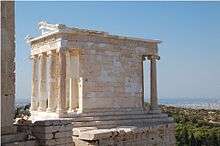Prostyle


Prostyle is an architectural term defining a row of columns in front of a building, as in a portico.[1] The term is often used as an adjective when referring to the portico of a classical building which projects from the main structure. First used in Etruscan and Greek temples, the Romans later on incorporated this motif in their temples.
Examples of prostyle include the Temple of Athena Nike, Akropolis, Athens, Greece, a prostyle tetrastyle (ie with four columns). There are also prostyle hexastyle or prostyle octastyle temples.
This architectural style probably originated in the eastern Greek isles in the 8th century BCE, however there are also many examples in archaic temples in southern Italy.
The following evolution of temple design came with the amphiprostyle, where there rows of columns both in front and at the back of the temple.
Notes
- ↑ Fleming, John; et al. (1981). The Penguin Dictionary of Architecture. Harmondsworth, Middlesex, England: Penguin Books. p. 254.
External links
